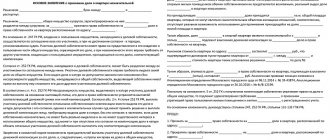Home / Real estate / Land / Ownership
Back
Published: 05/14/2017
Reading time: 13 min
0
871
Along with the acquisition of property rights, the fact of its deprivation is no less important. In our article we will tell you in detail about the legal norms that govern the termination of ownership of a plot of land.
About how ownership of a piece of land arises, about the grounds for termination and about the procedure itself.
- Legislation
- When can ownership arise?
- Grounds for termination of ownership of land plots Refusal of ownership of land
- Alienation of a land plot in favor of other persons
- Forced alienation of land from the owner in favor of the state If encumbrances were imposed on the land
- When land is inherited by a foreign person
- Land may be requisitioned, confiscated or nationalized
The concept of termination of ownership of a land plot
In accordance with constitutional acts in the field of land legal relations, it is established that land as a natural resource can be used by state, municipal bodies or private individuals. The object of property rights in this case is a specific territory, which includes the surface layer of the earth, fertile soil, as well as all water resources and minerals.
The right of ownership to any land plot consists of the ability to own it, use it for personal purposes, and also dispose of personal real estate at one’s own discretion. The reverse side of this concept is the termination of land ownership, which consists of the removal of a plot from the possession of a civilian.
This legal operation is possible in the event of a voluntary alienation by the owner of his own land in favor of other persons, when expressing the owner’s voluntary renunciation of the right to own a land plot, after the forced seizure of real estate (land) in a judicial or civil manner.
Grounds for termination of ownership of a land plot
Lands that are at the disposal of state or municipal bodies are legally provided for the use and ownership of individuals and legal entities.
Legal entities of foreign origin, citizens of other countries, as well as persons without any citizenship do not have the right, certified by the current law, to own their own land territories that are located within the border limits, as well as to purchase real estate in the form of land plots for further farming or gardening activities .
There are several different forms of land ownership rights, which differ in the legal side of the issue. Accordingly, citizens can receive the right to permanent or gratuitous temporary use, lifelong inheritable possession, as well as the right to private or public easements.
However, if the rules for handling land plots provided for by law are violated, serious reasons may arise for forced seizure of territories or voluntary refusal to use them. There are the following reasons for termination of ownership of a land plot:
- voluntary alienation of a land plot by owners in favor of other persons;
- voluntary renunciation of the owner's legal right of ownership of land;
- confiscation of a land plot by any state or municipal authorities from the owners is forced.
Grounds for termination of land rights
What are the grounds for termination of ownership of land?
- On a voluntary basis. In this case, the owner of the land himself wants to terminate the ownership of the land and transfer it to another person. Usually the owner sells the land, rents it out or donates it. A citizen can also voluntarily renounce ownership of a plot of land in favor of a third party or the state.
- Forced liquidation of ownership rights to a plot of land. In this case, a citizen is deprived of property rights without his consent or taking into account his opinion. The grounds on which forced liquidation is possible are prescribed by the law of the Russian Federation.
Alienation of a land plot by the owner
Alienation of land property is a special form of disposal of real estate, which consists in the possibility of the land owner exercising his powers to dispose of the property legally owned by him. Alienation consists of the owner transferring his property into the legal ownership of another citizen.
There are various forms of alienation of land plots, which differ from each other, namely:
- paid alienation of land, which can be realized in the form of purchase or sale;
- gratuitous alienation of a plot, for example, donation.
In addition to voluntary cases of alienation of land plots, the laws provide for forced cases of alienation, which are carried out without expressing the will of the owner for confiscation, requisition, or for the use of the site for state or municipal needs.
In the processes of alienation of land plots, there are important features that are provided for by civil law. For example, lands that have been withdrawn from general circulation cannot legally be provided for the use of private individuals or be the main objects of any transactions.
In addition, the alienation of land suitable for agricultural and farming work, the organization of gardening or vegetable gardening, as well as the construction of personal housing or ancillary buildings occurs in accordance with specialized acts of civil legislation.
When the rights of land owners are violated
There are often situations when rights that have been violated are restored; these rights have a connection with land plots. There are also cases of seizure of property from unlawful possession, elimination of reasons affecting its use. The Civil Code and the Land Code of the Russian Federation describe situations that are interconnected with violations of rights to allotments. This is unauthorized occupation of territory or cases when authorized government bodies issue regulations that violate the rights of the owners of the object in question.
The article of legislation also considers as violations situations when littering of a land plot is carried out or signs located on the territory are eliminated. This applies to marks that are used to define boundaries or reflect certain types of information. The situation may also concern pollution or the destruction of a layer of land that is considered fertile.
IMPORTANT !!! If such a situation is established, a citizen should understand who to write a complaint to and what methods to use to protect their rights. It is worth noting that the rights of the owners are subject to restoration.
Refusal of the owner's right of ownership of the plot
In order to legally carry out a voluntary renunciation of a land plot, the owner of the land should submit an appropriate application, which will outline the desire. Such a document must be submitted to a government agency that carries out state registration of rights to any real estate and controls the conduct of any real estate transactions.
If the procedure is fully followed, ownership of a specific plot will be completely terminated from the moment of state registration of the fact of termination of ownership of the plot. In order for an executive or judicial body to make a decision to terminate ownership of any land plot, the land owner should submit the following package of documents to the state or municipal body:
- a statement expressing the renunciation of ownership rights to a specific plot;
- a copy of documents confirming the identity of the applicant or the fact of state registration of a legal entity in a special register;
- cadastral passport of a plot of land, if the state land cadastre contains data on a specific plot;
- if the owner has documents that confirm ownership of the site;
- if there are no documents on ownership of the plot, then you need to provide documents that indicate the provision of the land plot by a municipal or state body.
The procedure for the owner to renounce rights to land
Any owner of a land plot can voluntarily abandon it on the basis of his own application. Typically, refusal is associated with difficulties in cultivating the land and unwillingness to pay mandatory taxes to the budget.
If the owner stops cultivating the land and publicly declares his reluctance to continue to own the land he owns, then these actions cannot be regarded as termination of his property rights.
In order to officially terminate his right to land, the owner must submit an application of the established form to the territorial division of the Rosreestr service at the location of the allotment. If there is no legally registered ownership right, the applicant is obliged to attach the documents he has confirming title to the site. Providing a cadastral passport is not a mandatory condition.
It is acceptable to submit an application and accompanying documents to the registration authorities by mail. The applicant's signature on the refusal application must be certified by a notary.
Within 30 days, the authorized body registers the cancellation of the private right to the land plot, of which the applicant is notified in writing. There is no state fee for registration actions of this kind.
After the owner of the land has officially renounced ownership of the property, the site becomes the property of city or municipal authorities. Since this procedure is a direct indication of the current legislation, the consent of the subject to receive ownership of the abandoned plot is not required.
Forced seizure of land
State or municipal bodies have the legal right and ability to forcibly withdraw land from the personal possession of individuals. Such a process is possible if the owner of the plot has not entered into a voluntary agreement to seize the land or he does not agree with such a court decision. In this case, the law provides for forced seizure of property.
Seizure of plots is possible only upon a court decision. A legal claim is filed with the judicial authorities during the entire period of validity of the decision to seize the land, however, this document cannot be filed with the court earlier than three months from the date the land owner receives such a draft future agreement for the seizure.
A package of documents is requested from the owner if the necessary papers are not at the disposal of the executive body or the available data is insufficient to make a decision on forced seizure.
Thus, termination of ownership of land plots is possible voluntarily or compulsorily, subject to the availability of appropriate documentation or court decisions.
Author of the article
14. GROUNDS FOR THE ARISE AND TERMINATION OF LAND LEGAL RELATIONSLand relations
– these are relations regarding the use and protection of lands as the basis for the life and activities of peoples living in the corresponding territory.
The grounds for the emergence, change and termination of land legal relations are legal facts, i.e. circumstances entailing legal consequences in accordance with the law. So, according to Art. 8 of the Civil Code of the Russian Federation, which is also applicable to land relations, civil rights and obligations arise from the grounds provided for by law and other legal acts, as well as from the actions of citizens and legal entities that give rise to civil rights and obligations.
Civil rights and obligations arise, in particular:
– from contracts and other transactions provided for by law, as well as from contracts and other transactions that do not contradict the law;
– from acts of state bodies and local governments;
– from a court decision;
– as a result of the acquisition of property on grounds permitted by law;
– due to other actions of citizens and legal entities;
– as a result of events with which the law or other legal act associates the onset of civil consequences.
Due to the specific nature of land relations, in most cases the basis for their occurrence is not an agreement, but an administrative act.
Rights to land as an object of real estate are subject to state registration and, accordingly, arise from the moment of registration of the corresponding rights to the land plot.
Rights to land plots arise on the grounds established by civil law. Land plots that are in state or municipal ownership may be made available to private property of citizens and legal entities. The right of permanent (indefinite) use, lifelong inheritable possession, gratuitous fixed-term use of a site in state or municipal ownership is granted on the basis of a decision of an authorized state or municipal body.
Grounds for termination of land legal relations.
Grounds for termination of ownership: when the owner alienates his land plot to other persons, the owner renounces the right of ownership of the land plot, due to forced seizure from the owner of his land plot.
Grounds for termination of the right of permanent (indefinite) use of a land plot, the right of lifelong inheritable possession: refusal of the land user to renounce their right or due to forced seizure.
The lease of a land plot is terminated on the grounds provided for by civil law.
Free-term use is terminated by the decision of the person who provided the plot, or by agreement of the parties: upon the expiration of the period for which it was provided; when the land user refuses his right or due to forced seizure.
A private easement is terminated on the grounds provided for by civil law. A public easement is terminated if there are no public needs for which it was established.
There are also seizures of land for state or municipal needs, confiscation and requisition of land.
Table of contents







